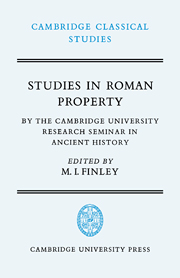Book contents
- Frontmatter
- Contents
- Preface
- 1 INTRODUCTION
- 2 SOME CONFIGURATIONS OF LANDHOLDING IN THE ROMAN EMPIRE
- 3 IMPERIAL ESTATES
- 4 CLASSICAL ROMAN LAW AND THE SALE OF LAND
- 5 THE CICERONIAN ARISTOCRACY AND ITS PROPERTIES
- 6 PRIVATE FARM TENANCY IN ITALY BEFORE DIOCLETIAN
- 7 URBAN PROPERTY INVESTMENT
- 8 AGRI DESERTI
- Notes
- Bibliography
- Index
1 - INTRODUCTION
Published online by Cambridge University Press: 05 June 2014
- Frontmatter
- Contents
- Preface
- 1 INTRODUCTION
- 2 SOME CONFIGURATIONS OF LANDHOLDING IN THE ROMAN EMPIRE
- 3 IMPERIAL ESTATES
- 4 CLASSICAL ROMAN LAW AND THE SALE OF LAND
- 5 THE CICERONIAN ARISTOCRACY AND ITS PROPERTIES
- 6 PRIVATE FARM TENANCY IN ITALY BEFORE DIOCLETIAN
- 7 URBAN PROPERTY INVESTMENT
- 8 AGRI DESERTI
- Notes
- Bibliography
- Index
Summary
The dominant place of the land in the economy and society of classical antiquity is a commonplace. Yet no synoptic view of the subject has been attempted in the past half-century, none on Rome alone for more than eighty years. This book does not pretend to fill that gap. To begin with, a narrow focus was selected for the inquiry, which may be defined crudely as Roman investment in property. That ruled out some of the best known aspects of the larger theme, such as land tenure or the history of the ager publicus during the Republic – not because these are less important aspects but because, for intensive cooperative study, it was necessary to restrict the field to something which would be manageable (given our limited resources) and yet permit us to look at the same questions from several viewpoints. That is also why slavery was taken for granted, so to speak, and not investigated except as it had to be set against tenancy, for example.
Just what the notion of ‘investment’ meant in Roman society is one of the subjects of the inquiry: no presuppositions about maximization of income and the like were implicit in the choice of the word. Nor, in so far as that was possible, did we start from, or even give much attention to, the familiar and explicit Roman value judgements on the subject of land, whether in Cato or in Cicero or in anyone else.
- Type
- Chapter
- Information
- Studies in Roman PropertyBy the Cambridge University Research Seminar in Ancient History, pp. 1 - 6Publisher: Cambridge University PressPrint publication year: 1976

